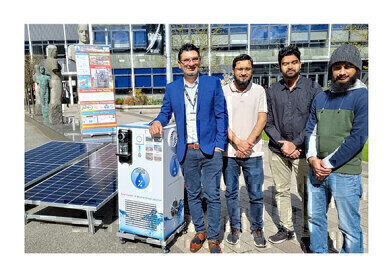Water/Wastewater
Northumbria University Scientists Develop Portable System for Drinking Water Generation Using Air and Sunlight
May 18 2023
Scientists at Northumbria University have created an innovative solution for producing clean drinking water that can be easily deployed in rural communities without requiring specialized knowledge. The United Nations reports that one in three people worldwide still lack access to safe drinking water, sanitation, and hygiene services, a problem exacerbated by climate change, conflicts, and population growth. This lack of water access exposes communities to water and sanitation-related diseases, with over 800,000 deaths annually attributed to unsafe drinking water, sanitation, and hand hygiene, particularly due to diarrhoea.
Over the past decade, Dr Muhammad Wakil Shahzad, an Assistant Professor in Northumbria's Department of Mechanical and Construction Engineering, has been working on pioneering solutions to address water scarcity. His latest project, 'Solar2Water,' introduces a groundbreaking water production unit that utilizes solar energy to extract moisture from the air and convert it into clean and safe drinking water.
The patented Solar2Water system overcomes the limitations of traditional atmospheric water generators by producing a consistent amount of water, irrespective of outside air humidity. Additionally, it generates double the amount of water using the same energy input. The unit operates solely on solar energy and features two solar panels that capture sunlight to initiate water production. A battery system stores energy during the day, enabling round-the-clock operation and supplying water for daily needs.
The Solar2Water system requires no training or expertise to operate and possesses a robust mechanical design that allows for operation in any environment. This versatility enables quick and easy deployment to various locations such as disaster zones, field hospitals, offices, refugee camps, army camps, and remote communities lacking grid connections or nearby water sources. The system operates independently of existing bodies of water, making it a water-neutral solution.
Dr Shahzad's technology has the potential to revolutionize the establishment of sustainable water supplies in underdeveloped areas, thereby contributing to the achievement of two of the United Nations' Sustainable Development Goals: Zero Hunger and Clean Water and Sanitation for all.
Regarding the project, Dr Shahzad stated, "I noticed that remote and non-coastal communities, where there is no grid connection or water supply, are often overlooked. This inspired the development of Solar2Water as a decentralized water solution to provide water for remote communities, refugee camps, and field hospitals, utilizing solar energy and ambient air. Importantly, Solar2Water can also empower women and girls in remote communities who spend countless hours each day walking long distances to fetch water. Producing water from air locally using solar energy can remove barriers to education, recreation, and escaping poverty."
Dr Shahzad initially received funding from the University to demonstrate the Solar2Water concept. After successfully developing the prototype unit in the laboratory, he secured Proof-of-Concept funding from Northern Accelerator, a collaborative initiative among universities in the Northeast. This funding supports the scaling up and commercialization of Solar2Water, with the goal of launching a university spinout company capable of mass-producing the units for global distribution to communities in need.
Tim Hammond, Programme Lead of Northern Accelerator and Director of Commercialisation and Economic Development at Durham University, expressed the potential for research conducted by the North East's universities to address regional, national, and global challenges. The Northern Accelerator has significantly improved university spin-out performance in the region, enabling academics to translate their research into real-world social and economic impact. The Proof-of-Concept funding supports Dr Shahzad in bringing the technology closer to becoming a commercial product accessible to those struggling with access to clean drinking water.
Events
IWA World Water Congress & Exhibition
Aug 11 2024 Toronto, Canada
Aug 25 2024 Stockholm, Sweden and online
Sep 03 2024 Mexico City, Mexico
Sep 03 2024 Mexico City, Mexico
Sep 03 2024 San Diego, CA, USA



..jpg)









